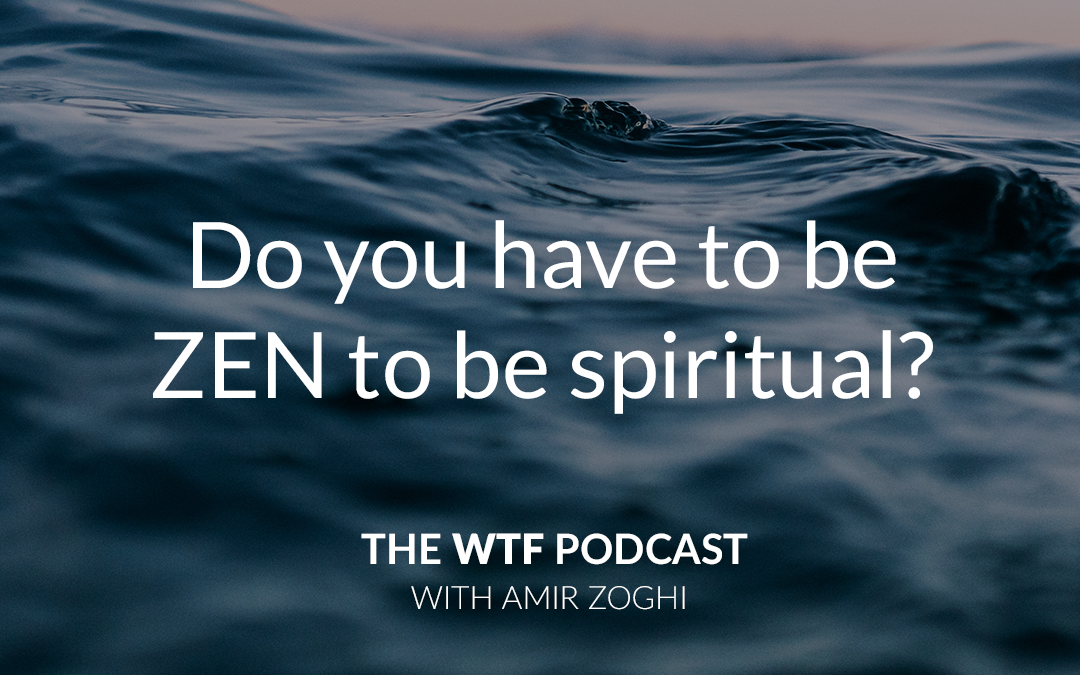
People think when they’re on a spiritual path they have to be neutral, detached, and “in control” of their emotions. In other words, be in a “zen” state at all times.
This is a big misinterpretation of spirituality because in order to live this way, most people end up suppressing their emotions. Yet, the emotions you try to suppress, will continue to express.
So what do you do instead? How can you neutralize your emotions without trying to push them aside? In this episode of The Wisdom, Truth & Freedom Podcast, I’m sharing the greatest power you have on your journey to self-actualization and how to harness it when it comes to your emotions.
Podcast Launch: Get the Mind Over Matter Challenge free!
To celebrate the launch of my new podcast, I invite you to have a listen to the first 3 episodes & leave a review on Apple Podcasts. As a thank you, I’ll gift you my powerful Mind Over Matter 30 Day Mindset Challenge.
To receive your free gift:
Step 1: Subscribe to the podcast on Apple Podcasts via iTunes or iPhone.
Step 2: Download and listen to the first 3 episodes of the podcast on Apple Podcasts.
Step 3: Leave a rating & review on Apple Podcasts.
Step 4: Send us an email at contact@amirzoghi.com letting us know you’ve done so and we’ll give you access to the Mind Over Matter Challenge.
::::::::::::::::::::::::::::
Episode Transcript:
Hello and welcome people of the universe. So, today’s podcast I’m going to be talking about the misinterpretations of spirituality. And today I’ve labeled the title “Do You Need To Be Zen In Order To Be Spiritual”?
I find that when people are on the spiritual path, there is a big focus on acting the right way, you know? Responding in a certain way, maybe with a calm demeanor and slowing everything down because I am so spiritual, you know what I mean? So, that’s what I mean by zen. And of course, I’m not disregarding being zen. Of course, being zen, or sometimes I refer being zen as to being neutral. I want to quickly clarify being neutral doesn’t mean being boring.
Sometimes people go, “Oh, well that sounds boring.” No, neutral means you are connecting to everything. You are not responding just to one thing. You’re not emotionally charged with a positive charge or a negative charge. The positive charge and negative charge have come together and neutralized, okay? That is zen state. Now, the problem with that is that most people see that, “Oh, so that is the goal. I need to become zen. I need to become zen master. And so, to become zen master, I need to keep my emotions in check.” This is the greatest misinterpretation, well, one of the greatest. It’s the greatest for the one I’m talking about right now, anyway.
This is a great misinterpretation because yes, you want your emotions to be checked. But you don’t want to be suppressing your emotions. You know, I meet sometimes spiritual people, and including myself when I was on my spiritual path. And it’s not that I’m not on a spiritual path right now, it’s just the word spirituality means something completely different to me, where before it was an idea, it was a parameter, a box that I needed to fit into. It’s not that anymore. It’s now bringing my true self, my every essence outside and not trying to fit into a box.
So, spirituality for me today means being myself completely. So, my spirituality is always different to your spirituality because we are not the same. Although we are the same … one of the same, if you like, from a oneness point of view, we are different expressions of that. We are different versions of the same, just like you have waves within the ocean. Yes, we are all part of one ocean, but each wave is a different version of the same ocean. So, to me, that’s what spirituality is, just to clarify as I do this podcast series of misinterpretations of spirituality, you know?
The problem with the … One of the greatest misinterpretations of spirituality, and I keep saying one of the greatest because there’s so many of them. But one of the greatest misinterpretations is that we are trying to fit into a box that someone said that this is what it looks like to be spiritual. And today’s podcast is about that. It’s about being zen. You need to be zen. You need to be neutral. You need to be a certain way. You need to talk a certain way. You need to respond a certain way in order for you to fit into that box of spirituality.
So, the challenge with that, the misinterpretation here is that what most people do when they realize, “I need to be zen master,” or, “I need to become zen,” or, “I need to be neutral. I need to be detached.” The problem with that is what most people do is they suppress the emotions that arises. So, when they are feeling excitement or enthused or angry or having a great reaction to something, right? Or sadness, what they do is they try to neutralize it in the incorrect way, which is they try to suppress it or disregard it. So, they just push it aside or push it in.
So, you push it aside by disregarding it, by being in denial of it, or you suppress it by pushing it within yourself. And as we all know, whatever we suppress will continue to express itself. It will just keep coming back up. I think one of the spiritual teachings is, what you resist will continue to persist. So, you’ve probably heard that in different spiritual teachings. That is the issue, you know? I’ve met many … I’ve met spiritual people in the past where you can see they are angry about something. Like, within themselves, there’s this volcano happening, but they will manage it and talk really calmly, you know? Because the perception or the importance of being perceived to be spiritual or zen is far more important than actually being zen itself.
So, this is what I want to talk to you about today, is what do we do about that. The thing is, when we are to become zen, one needs to address, rather than put something aside or be in denial of it, you need to address it. You need to become aware of it. And if an emotion is arising and you’re having anger or super excitement, you know? Which is these positive or negative emotions, you want to address these. And you’ll probably think to yourself, “Well, hang on a sec. What’s wrong with having super excitement and positive reactions?” Nothing, the issue can be that when you are super excited and you’re being super positive is that you try to stay that way, you try to keep that, you try to manipulate yourself in order to stay positive. And the truth is, you can’t.
Positive and negative emotions are the duality experiences that we experience. We have positive and negative emotions. The zen state is not in positive nor negative, it’s in this middle ground, this centered space that is commonly what I refer to as neutrality. I commonly refer to expressing our infiniteness. That’s when you’re experiencing or being in the infiniteness, if you like, oneness. Or in this case, we’re talking about being zen.
So, to get to that place, what you need to do, you need to acknowledge … So, let’s talk about, positive emotion is not easy for people to comprehend straight away because they’re thinking, “Well, what’s wrong with positive?” That’s the thing. When I talk about negativity or you’re feeling angry, you’re feeling sadness, you’re feeling resentment, you’re feeling guilt, you’re feeling jealousy, you go, “Oh, those things I don’t want to feel,” okay? All right, well let’s tart with that. Let’s talk about those things.
The thing is, to be zen, you don’t want to push that aside, as I’ve just talked about. What you have in your hands, our greatest power that can heal any of those emotions or can neutralize any of those emotions is love. And what I can tell you about love and its energy is that it is an open feeling. It’s an open energy. Yes, fear or negative is closed. You can actually relate to this if you just look at yourself physically and what you do when you’re in love or when you’re in fear.
Maybe a month ago or so, I was at the airport picking up some friends who were visiting from the United States. They were coming to one of my retreats. And as I’m sitting there waiting for them to come out of the gates, I was just watching and I was really appreciating watching people going and picking up their friends. And I love doing that, it’s one of my things. As a kid, I used to love watching planes come in, now I love watching people getting off the planes. It’s amazing to see the expressions and the appreciation and the love that is experienced when two people who maybe haven’t seen each other for a long time come together and I guess hug each other.
And that’s the thing, you see, if you think about it, if you haven’t seen someone for a long time who you really care about, what do you do when you first see them? You open your arms up and you embrace them. Yeah? Listen to this, you open your arms up and you embrace them. See, that’s what real love is, it’s an open energy. So, when you are experiencing these negative emotions, what most people … their normal response is to resist them, to push them down.
And obviously if you keep pushing emotions down, not only will they continue to persist, but it can cause different diseases and depression. So, you don’t want to be doing that. But this is the thing, most people keep pushing it down just in order to be zen. I need to say, “Hey, that emotion doesn’t feel zen. So, if the emotion doesn’t feel zen, I need to push it down.” No, no. You need to embrace it. See? What’s the opposite of judgment? I talk about this in my WTF Experience, the program that I actually tun. I talked about judgment.
And if you want to transcend judgment or rise above judgment, what is the opposite of judgment? Well, people say, “Well, it’s acceptance.” Yes, correct. It’s acceptance. But how do you do acceptance? You can’t do acceptance, it’s not a doing thing. It’s a being thing. You’re being acceptive. You can’t do love, you are being loving. You can’t do compassionate, you are being compassionate. So, you need to be the very thing that you’re trying to accomplish in your doing. So, how do you be accepting?
Well, you’re being accepting by embracing. The being experience of being accepting is embracing, just like when you’re meeting your friend who’s getting off the plane, you are embracing them. So, to use the love energy to heal these judgements or these emotions or these anger or whatever these negative charges that we’re talking about, you must embrace them, not resist them, embrace.
Again, I want to remind you that most people will resist them in order to be zen. But in order for you to be zen, you must address these. You must embrace these emotions. So, you embrace it. So, what does that feel like? Well, I can tell you when you begin to embrace an emotion, the first response is that the emotion intensifies. So, if you’re feeling anger, the anger intensifies, so you’ve now been inviting … You’re inviting yourself to now go, “Hey, this is not working, I need to resist the emotion. I need to push this away. I need to disregard this emotion of anger.”
No, no. You need to trust the process and stay open. Stay open and embrace the emotion. Yes, the energy will intensify. But what’s happening is that you are becoming one with that energy. Once you become one with that energy, love is healing it, love is curing it, all right? The energy may intensify, but the charge will dissolve. Now, you may try this and think to yourself, “This sounds plausible, I might try this.” Yes, you may try it, but let me tell you something, some of the charges you may have is very deeply ingrained. They’re very strong because maybe for many years you’ve held onto those charges. Maybe for many years you’ve been suppressing that charge.
So don’t look for an outcome or result when you do this. You need to trust the process. You need to do this, you need to embrace it. You need to what I call sit with it, right? Always when I’ve been teaching, I’ve been teaching this process for many years, a process of healing, that’s what it is. A process of reclaiming your power. But most people think to themselves when I say to sit with it, they come back, and sometimes I’m having a coaching client come back to me and they say, “You know what, Amir? I’ve been sitting with this thing for three months.” And I go, “Well, tell me about how you’ve been sitting with it.” And as they describe it, what I realize is that their attention is purely on the outcome or result, which is to get rid of it.
First of all, if you’re trying to get rid of it, that’s not embracing. Are you going and hugging someone that you haven’t seen for a long time to get rid of them? No, you’re not, are you? So, you are embracing. So, again, you cannot put your attention on the outcome and result, and the outcome and result you’re thinking to yourself is, “To heal this so I can get rid of it.” That is the first mistake that someone makes.
You’re trusting the process, you are being completely open to the emotion. You actually are allowing the emotion to stay there. You’re allowing the emotion to be there. You need to trust that because your normal mind, your normal reaction, your ego wants to come in and goes, “Hey, we need to get rid of this thing.” The ego wants to fight with this emotion, which actually fuels it.
So, this is a very powerful process if you can do it authentically. And authentically means you’re doing it without reason. Whenever you place reasons on things, because love doesn’t have reasons, whenever you place reasons and add reasons to things, you’re no longer doing it authentically. It’s not your authentic truth anymore, right? So, you need to actually just first allow this emotion to be there. You’re not trying to get rid of it. Forget about this outcome or result of trying to get rid of it or even trying to heal it, you’re giving it space. You are allowing it to be there, you are giving it space.
And ultimately, when I have these coaching clients, and I was telling you about my coaching client who was struggling with this process, the other thing that I realized that they were doing, when they were saying, “I was sitting with it,” they weren’t actually sitting with it. They were sitting with the resistance of it. That’s what you don’t want to do.
Again, you’re not sitting in resistance. You’re sitting in openness. So, yes, you may feel the energy intensify. You may feel … But what happens when the energy intensifies? If you’re staying open, it just becomes an energy that is intensifying. You almost forget what the energy or what the label was. Was it sadness? Was it anger? Sometimes, personally when I’ve done this, I forget why I was even feeling this way. That’s when you know you’re becoming one with the emotion.
So, to be zen, it’s not to suppress it. It’s not to disregard it. It’s not to be in denial of it. And that’s what most people do because they think, “This is the zen state. So, this doesn’t feel so zen. So therefore, I need to get rid of it.” No, you need to be one with it. Yes, zen is important, yes, being neutral is important. Yes, that’s when you are in your power. But to get to that place, it takes work. It takes sometimes many years work. The greatest work that you could be doing in this world is the work that you do on yourself. Yet, we keep thinking it’s the work that we need to do on other people, “Other people need my help or the world needs my help,” or the work, “I need to do financial work. I need to go to work and get paid.”
No, the greatest work that you will do is the work that you will do on yourself. And there’s no greater work that you will do than being zen. So, do you need to be zen to be spiritual? Well, you can answer that. Potentially, yes, I think you need to be neutral. But how you find zen, how you find neutrality, how you find your true power, that’s where the misinterpretation is. I hope that helps you. That’s today’s podcast. I’ll see you next time.
::::::::::::::::::::::::::::::::::::::::::::::::::::::::
What did you think of this episode? I’d love to hear your feedback in our Amir Zoghi Community on Facebook. Click here to join the free private group.

Ask Amir: Got a burning question you’d love to ask Amir about mindset, spirituality or your journey to self-actualization? Submit your question here and he may answer it on a future Ask Amir episode of The WTF Podcast.
